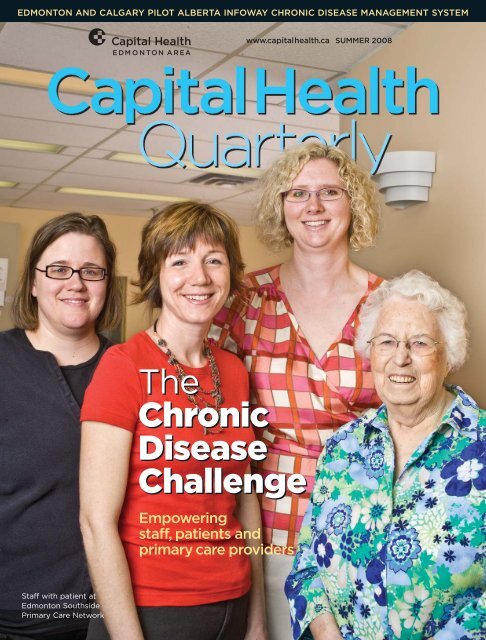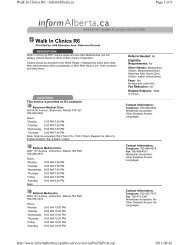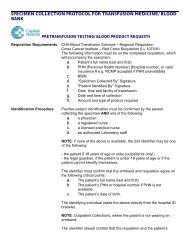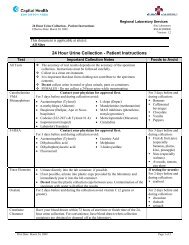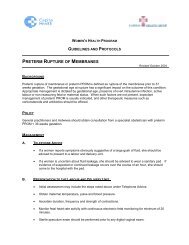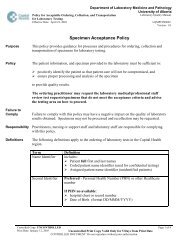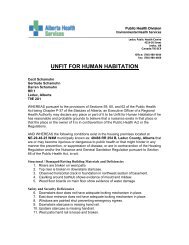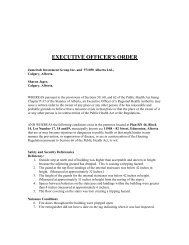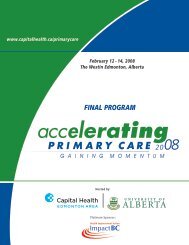The Chronic Disease Challenge The Chronic ... - Capital Health
The Chronic Disease Challenge The Chronic ... - Capital Health
The Chronic Disease Challenge The Chronic ... - Capital Health
You also want an ePaper? Increase the reach of your titles
YUMPU automatically turns print PDFs into web optimized ePapers that Google loves.
EDMONTON AND CALGARY PILOT ALBERTA INFOWAY CHRONIC DISEASE MANAGEMENT SYSTEM<br />
www.capitalhealth.ca SUMMER 2008<br />
<strong>The</strong><br />
<strong>Chronic</strong><br />
<strong>Disease</strong><br />
<strong>Challenge</strong><br />
Empowering<br />
staff, patients and<br />
primary care providers<br />
Staff with patient at<br />
Edmonton Southside<br />
Primary Care Network
capitalhealth.ca<br />
<br />
<br />
408-LINK<br />
OR TOLL-FREE<br />
1-866-408-LINK (5465)
SUMMER 2008<br />
IN FOCUS<br />
5 Preventive Medicine<br />
Addressing problems early on, or before they happen,<br />
saves time, money and the health of our residents.<br />
<strong>Capital</strong> <strong>Health</strong> is working with family physicians to<br />
do just that through the shared care approach of<br />
local Primary Care Network (PCN) health teams.<br />
BEST PRACTICES<br />
9 Reducing medication errors<br />
PARTNERSHIPS<br />
10 Alberta Infoway CDM pilot<br />
RESEARCH<br />
12 Monitoring diabetes in Alberta<br />
13 Advice line offers real-time support<br />
14<br />
LEADERS IN HEALTH<br />
14 Self-management program for youth<br />
IN THE COMMUNITY<br />
16 Empowering patients through<br />
education<br />
17 Future plans for chronic care<br />
18 <strong>Chronic</strong> disease community networks<br />
19 Preventing falls in seniors<br />
BEST PRACTICES<br />
8 <strong>The</strong> Right Platform<br />
Primary Care Networks are changing the way services get<br />
delivered and improving the quality of care delivered by<br />
health professionals. Nowhere is this more striking than in<br />
chronic disease, where PCNs are proving to be the right<br />
platform for supporting people in managing their condition.<br />
15 Electronic Manager<br />
An electronic patient registry that has been helping<br />
health teams manage patients with diabetes will expand<br />
to support patients with other chronic conditions. To date,<br />
the chronic disease management (CDM) registry contains<br />
information on more than 12,000 patients with diabetes.<br />
9 12 15<br />
NEWS AND NOTES<br />
20 Grey Nuns Community Hospital<br />
expands women’s health<br />
21 New institute supports geriatrics<br />
ON THE COVER: patient Caroline Jodrey with nurse practitioner<br />
Sheri Fielding (left), dietitian Robin Anderson and Dr. Carmen Gingles<br />
by Laughing Dog Photography Inc.<br />
THIS PAGE: Lisa Gerard (from left), Jenn Fearon and Peggy Clarke<br />
(top left), pharmacist Amy Lau by Laughing Dog Photography Inc.<br />
(bottom left), RN Karen Kastelic by Stephen Wreakes/<strong>Capital</strong> <strong>Health</strong><br />
(bottom right).<br />
Canada Post Publications Mail<br />
Agreement Number 40639561<br />
www.capitalhealth.ca SUMMER 2008 ~ CHQ 3
FROM THE DESK OF SHEILA WEATHERILL<br />
<strong>Chronic</strong> disease management –<br />
empowering patients and practitioners<br />
<strong>Chronic</strong> disease is approaching epidemic levels around the world, yet the health system<br />
is still not meeting the needs of people with chronic conditions. <strong>Chronic</strong> illness makes up<br />
between 60 and 70 per cent of all health budgets, yet health systems are still focused on<br />
acute and episodic care.<br />
Many people live with multiple<br />
chronic problems, from arthritis and<br />
high blood pressure to diabetes and<br />
lung disease. Seventy to 80 per cent<br />
of people over 65 years have three<br />
or more chronic conditions. Eighty<br />
per cent of visits to physicians are<br />
related to chronic disease. As our<br />
population grows older and lives<br />
longer, the burden on the health<br />
system will only increase. To make<br />
a significant change in delivering<br />
health care, we need to change our<br />
approach to people with chronic<br />
conditions.<br />
In reading this special issue on<br />
chronic disease management, you<br />
will see the comprehensive approach<br />
<strong>Capital</strong> <strong>Health</strong> is taking to proactively<br />
prevent, assess and manage chronic<br />
disease. We have partnered with<br />
Alberta <strong>Health</strong> and Wellness, other<br />
health regions, University of Alberta<br />
researchers and our own Primary<br />
Care Networks (PCNs) to find better<br />
ways to improve the continuity<br />
of care among family physicians,<br />
specialists, hospitals and community<br />
care.<br />
As a leader in e-health, <strong>Capital</strong> <strong>Health</strong><br />
uses electronic technology to ensure<br />
multidisciplinary teams have the<br />
decision support tools they need<br />
at the point of care. We are also<br />
piloting a provincial chronic disease<br />
management initiative that offers<br />
real-time health summaries for<br />
patients with chronic conditions<br />
to improve the communication and<br />
coordination of care among health<br />
providers.<br />
<strong>Capital</strong> <strong>Health</strong> has partnered with<br />
PCNs, Calgary <strong>Health</strong> Region and<br />
Canada Infoway to build a chronic<br />
disease management registry.<br />
Initially focused on diabetes,<br />
the electronic patient registry<br />
(see page 15) gives physicians and<br />
care providers updated information<br />
to better manage their patients’<br />
conditions, thus reducing long-term<br />
risks and hospitalization.<br />
Dr. Richard Lewanczuk, Medical<br />
Director, <strong>Chronic</strong> <strong>Disease</strong> Management,<br />
<strong>Capital</strong> <strong>Health</strong>, oversees<br />
Edmonton’s diabetes program.<br />
He says integrated, interdisciplinary<br />
care for patients with diabetes makes<br />
a huge difference; Emergency visits<br />
by diabetics in the region are the<br />
lowest in the province.<br />
University of Alberta public health<br />
researchers are also working with<br />
<strong>Capital</strong> <strong>Health</strong> and PCNs to implement<br />
and evaluate new care programs for<br />
patients with diabetes. One PCN is<br />
developing the region’s first early<br />
intervention program for their<br />
pre-diabetic population.<br />
On page 14, you can read about the<br />
support we are giving young adults<br />
with chronic disease through the<br />
first official adaptation for youth<br />
of the Stanford <strong>Chronic</strong> <strong>Disease</strong><br />
Self-Management Program.<br />
As our health system evolves to<br />
improve care and reduce costs,<br />
we envision the day when every<br />
person has a family physician; the<br />
family physician is supported by an<br />
interdisciplinary team; our primary<br />
care teams can detect early chronic<br />
disease and intervene before complications<br />
arise, while preventing<br />
chronic disease in patients at risk;<br />
and we use electronic tools to track<br />
and update medical conditions from<br />
birth to support our residents in<br />
lifelong health maintenance.<br />
Sincerely,<br />
Sheila Weatherill, C.M.<br />
President and CEO<br />
www.capitalhealth.ca<br />
<strong>Capital</strong> <strong>Health</strong> Quarterly is published by <strong>Capital</strong> <strong>Health</strong> Public Affairs.<br />
EDITOR<br />
Dawna Freeman<br />
dawnafreeman@cha.ab.ca<br />
780-482-8660<br />
ART DIRECTOR<br />
Julie Wons<br />
CONTRIBUTING WRITERS<br />
Cecilia Bloxom, Tadra Boulton, Judith Dyck, Dawna Freeman,<br />
Mellissa Kraft, Carolyn O'Handley, Holly Regal, Carrie Rosa<br />
CONTRIBUTING ILLUSTRATORS/PHOTOGRAPHERS<br />
Laughing Dog Photography Inc., Stephen Wreakes<br />
We welcome your story ideas and comments. Send your<br />
comments to the Editor at dawnafreeman@cha.ab.ca.<br />
Photos and articles may not be reproduced without the<br />
written consent of the Editor.<br />
HOW TO REACH US<br />
<strong>Capital</strong> <strong>Health</strong> Public Affairs<br />
1J2.51 Walter C. Mackenzie Centre<br />
8440-112 Street<br />
Edmonton, AB T6G 2B7<br />
<strong>Capital</strong> <strong>Health</strong> Quarterly is printed by Ion Print Solutions<br />
on 80 lb Chorus Art Silk (50% recycled, 25% post-consumer).<br />
© Contents copyright 2008 by <strong>Capital</strong> <strong>Health</strong>.<br />
4 CHQ ~ SUMMER 2008 www.capitalhealth.ca
IN FOCUS<br />
Primary Care Networks focus on<br />
chronic disease<br />
management<br />
It used to be that when you got sick, you would see<br />
a doctor or go to the hospital. That traditional way<br />
of treating illness and disease is beginning to shift.<br />
LAUGHING DOG PHOTOGRAPHY<br />
www.capitalhealth.ca SUMMER 2008 ~ CHQ 5
IN FOCUS<br />
“We know that addressing<br />
disease early saves<br />
the system money, time<br />
and most importantly,<br />
keeps our residents healthier.”<br />
DR. RICHARD LEWANCZUK,<br />
MEDICAL DIRECTOR FOR CHRONIC DISEASE<br />
MANAGEMENT, CAPITAL HEALTH<br />
Sheri Fielding, nurse practitioner and nurse leader in<br />
chronic disease management at the Edmonton Southside<br />
Primary Care Network, takes the blood pressure of patient<br />
Caroline Jodrey, 89, during a routine diabetes visit.<br />
<strong>Capital</strong> <strong>Health</strong>, in partnership with<br />
family doctors, is on the leading<br />
edge of managing chronic diseases<br />
and addressing problems before they<br />
happen. <strong>The</strong> region is advancing<br />
its ability to provide preventive<br />
medicine and put care plans in<br />
place for patients with chronic<br />
health conditions.<br />
“We know that addressing disease<br />
early saves the system money,<br />
time and most importantly,<br />
keeps our residents healthier,”<br />
says Dr. Richard Lewanczuk,<br />
<strong>Capital</strong> <strong>Health</strong>’s Medical Director<br />
for <strong>Chronic</strong> <strong>Disease</strong> Management.<br />
<strong>The</strong> new approach to chronic<br />
disease management started<br />
when <strong>Capital</strong> <strong>Health</strong> redesigned<br />
its diabetes program beginning<br />
in 2001. <strong>The</strong> redesign aimed to<br />
provide a standardized approach<br />
to treatment for all patients and<br />
included streamlining all referrals<br />
through a single central intake line.<br />
Since implementation, patients have<br />
experienced reduced wait times<br />
and now receive treatment and<br />
education from a health team,<br />
which includes a physician, nurse<br />
and dietitian.<br />
<strong>The</strong> learnings from this work, along<br />
with an emerging focus on family<br />
medicine through the 2003 Primary<br />
Care Initiative, have positioned<br />
<strong>Capital</strong> <strong>Health</strong> to better serve its<br />
patients in the prevention and management<br />
of chronic health problems.<br />
<strong>The</strong> Primary Care Initiative<br />
was formed between Alberta <strong>Health</strong><br />
Five years ago,<br />
the health regions including <strong>Capital</strong><br />
<strong>Health</strong>, Alberta <strong>Health</strong> and Wellness<br />
and the Alberta Medical Association<br />
chartered a bold new direction for<br />
delivering primary care – setting in<br />
place the groundwork for Primary<br />
Care Networks (PCNs). In partnership<br />
with family physicians, <strong>Capital</strong><br />
<strong>Health</strong> implemented the first Primary<br />
Care Network in Edmonton’s<br />
Southside in May 2005.<br />
<strong>The</strong>re are eight Primary Care<br />
Networks with one additional group<br />
of family physicians developing<br />
a business plan to create a ninth<br />
network. Approximately 55 per cent<br />
of family physicians in the region<br />
are participating in a PCN, providing<br />
care to 56 per cent of the region’s<br />
population.<br />
An overarching focus of PCNs<br />
is chronic disease management –<br />
and Wellness, the Alberta Medical<br />
Association and Alberta’s health<br />
regions, including <strong>Capital</strong> <strong>Health</strong>.<br />
<strong>The</strong> Primary Care Initiative aims to<br />
increase the number of Albertans<br />
with ready access to primary care.<br />
Primary care is the first point of<br />
contact with the health system<br />
helping residents manage conditions<br />
like diabetes, obesity, heart disease,<br />
asthma and chronic obstructive<br />
pulmonary disease. Physicians<br />
diagnose and treat the condition,<br />
while other members of the team<br />
complement that care by providing<br />
ongoing assessment, monitoring,<br />
education and support.<br />
Primary care teams help residents<br />
prevent chronic diseases by providing<br />
care before problems develop,<br />
which keeps residents healthier<br />
with improved quality of life and<br />
saves the health system time and<br />
resources.<br />
“We have been impressed with how<br />
the PCN has brought the physicians<br />
together to improve the quality<br />
of care in the community,” says<br />
Dr. Chuck Lortie, a Sherwood Park<br />
family physician. <strong>The</strong> Sherwood<br />
Park PCN has been in operation<br />
since June 2007.<br />
6 CHQ ~ SUMMER 2008 www.capitalhealth.ca
“We take the health of our<br />
residents, including those with<br />
chronic disease, very seriously.<br />
We also want to be proactive<br />
and prevent chronic disease<br />
wherever possible.”<br />
DR. RICHARD LEWANCZUK,<br />
MEDICAL DIRECTOR FOR CHRONIC DISEASE<br />
MANAGEMENT, CAPITAL HEALTH<br />
LAUGHING DOG PHOTOGRAPHY<br />
for everyday health services. It also<br />
increases emphasis on health promotion,<br />
disease and injury prevention,<br />
care of patients with medically<br />
complex problems and care of<br />
patients with chronic diseases.<br />
<strong>The</strong> agreement went even further<br />
in fostering a team approach to<br />
providing primary care by formally<br />
establishing the Primary Care<br />
Networks.<br />
Local PCNs are a successful example<br />
of using a team approach to help<br />
residents manage chronic conditions.<br />
PCNs are multidisciplinary teams<br />
which include family physicians,<br />
and may include registered nurses,<br />
licensed practical nurses, chronic<br />
disease nurses, mental health<br />
therapists, social workers, dietitians,<br />
pharmacists, and other health<br />
professionals.<br />
“It’s an important model that gives<br />
patients access to a wide-range of<br />
skills and information. For example,<br />
an individual with a new diagnosis<br />
of diabetes will have a care plan<br />
built by a number of different health<br />
professionals, working together,”<br />
says Dr. Lewanczuk.<br />
“<strong>The</strong> whole team is working together<br />
to provide the best care possible,”<br />
says Sheri Fielding, a nurse practitioner<br />
and Edmonton Southside<br />
PCN nurse leader. “It’s based<br />
on what the patient needs and<br />
who can best provide it.”<br />
Initially, <strong>Capital</strong> <strong>Health</strong> has focused<br />
its work on the following chronic<br />
diseases: asthma, chronic obstructive<br />
pulmonary disease, cardiovascular<br />
risk, diabetes, heart failure and<br />
obesity.<br />
“We take the health of our residents,<br />
including those with chronic disease,<br />
very seriously. We also want to<br />
be proactive and prevent chronic<br />
disease wherever possible,” says<br />
Dr. Lewanczuk.<br />
“<strong>Capital</strong> <strong>Health</strong> is a leader in e-health.<br />
We have the capability to identify<br />
from birth who is at risk of developing<br />
certain conditions based on a number<br />
of factors. In the meantime, we use<br />
risk-scoring procedures to keep an<br />
eye on those individuals at risk of<br />
chronic diseases and work to reduce<br />
that risk,” he says.<br />
Patients are also empowered to<br />
take charge of their own conditions<br />
through numerous programs offered<br />
by <strong>Capital</strong> <strong>Health</strong> including workshops<br />
on self-management and disease<br />
specific education such as Weight<br />
Wise and diabetes. A 24-hour<br />
<strong>Capital</strong> <strong>Health</strong> Link telephone line,<br />
staffed by registered nurses, is also<br />
available for residents who have<br />
questions about their conditions.<br />
Physicians and multidisciplinary<br />
staff also benefit from the chronic<br />
disease management model. <strong>Health</strong><br />
providers have received increased<br />
education and support as part of the<br />
implementation of the model, allowing<br />
them to screen for and manage<br />
chronic disease more effectively.<br />
“We know the benefits of managing<br />
chronic disease. We know that<br />
something needs to be done<br />
and we’re working hard to make<br />
a difference,” says Dr. Lewanczuk.<br />
www.capitalhealth.ca SUMMER 2008 ~ CHQ 7
BEST PRACTICES<br />
Accelerating Primary Care 2008 Conference<br />
Primary Care Networks –<br />
<strong>The</strong> Right Platform for<br />
<strong>Chronic</strong> <strong>Disease</strong> Management<br />
Defining Primary Care:<br />
Primary health care is the<br />
first point of contact with<br />
the health system, where<br />
people receive care from<br />
family physicians, and<br />
from nurses, pharmacists,<br />
therapists and others for<br />
most of their everyday<br />
health care needs.<br />
(Alberta’s Primary Care<br />
Initiative)<br />
Defining Primary Care<br />
Networks (PCNs):<br />
PCNs are a partnership<br />
with family physicians,<br />
the provincial government<br />
and the health regions.<br />
Groups of family physicians<br />
with teams of health<br />
professionals work<br />
together to meet the<br />
health needs of residents<br />
in a specific geographic<br />
area. Services include:<br />
chronic disease management,<br />
after hours clinics,<br />
linking new patients to<br />
physicians, mental health<br />
services, home care and<br />
geriatric care.<br />
PRIMARY CARE NETWORKS (PCNs) ARE CHANGING<br />
the way services get delivered and improving the quality<br />
of care delivered by family physicians and the other health<br />
professionals working with them. Perhaps nowhere is<br />
this more striking than in chronic disease, where PCNs<br />
are proving to be the right platform for supporting people<br />
in managing their chronic conditions.<br />
<strong>Chronic</strong> disease management<br />
was a recurring topic at the recent<br />
Accelerating Primary Care 2008<br />
conference hosted by <strong>Capital</strong> <strong>Health</strong><br />
in partnership with the University<br />
of Alberta this spring. Presenters<br />
shared new approaches and spoke<br />
about delivering effective responses<br />
to chronic disease management (CDM)<br />
through Primary Care Networks,<br />
including more systematic follow-up,<br />
a better understanding of population<br />
needs and the ability to aggregate<br />
resources and improve responsiveness.<br />
PCNs offer the opportunity to<br />
improve quality and access through<br />
the use of the electronic medical<br />
record, same day appointments<br />
and working with patients to ensure<br />
consistent follow-up and screening.<br />
Dr. Ernie Schuster, Medical Director<br />
for <strong>Capital</strong> <strong>Health</strong>’s Primary Care<br />
Division and a family physician with<br />
the Edmonton West PCN, talked<br />
about the challenges of moving<br />
from a culture that put the onus<br />
on the patient to follow-up, to a<br />
proactive health management culture<br />
where screenings are paneled, tests<br />
scheduled and follow-up is automatic.<br />
<strong>The</strong> heart of being able to respond to<br />
the needs of patients, Dr. Schuster<br />
explained, is same day access. It<br />
reduces the number of bad things<br />
that can happen because problems<br />
are caught earlier, lowering hospitalizations<br />
and emergency department<br />
visits. For patients with chronic<br />
diseases such as heart failure and<br />
diabetes, this can be the difference<br />
between living well and deteriorating<br />
health.<br />
A PCN team also has the capacity<br />
to identify high risk groups amongst<br />
its patients, and plan new ways to<br />
lower the incidence and severity<br />
of chronic disease. Debbie Wilson,<br />
general manager, St. Albert and<br />
Sturgeon PCN, talked about the<br />
PCN’s use of the diabetes registry<br />
to determine patient interventions –<br />
offering group sessions on diabetes<br />
prevention, eating well and living<br />
with chronic disease. <strong>The</strong>ir PCN has<br />
developed relationships with <strong>Capital</strong><br />
<strong>Health</strong>, the University of Alberta’s<br />
School of Public <strong>Health</strong> and Physical<br />
Education Faculty and Servus Credit<br />
Union Place, among others, to<br />
broaden and inform the group<br />
initiatives, something that would<br />
be difficult for a sole practitioner<br />
to organize.<br />
8 CHQ ~ SUMMER 2008 www.capitalhealth.ca
In another innovative approach,<br />
Robin Anderson and Loreen Wales,<br />
both registered dietitians with<br />
Edmonton Southside PCN, described<br />
the use of group appointments<br />
to meet the demand for dietitian<br />
services. In their presentation, aptly<br />
entitled “So Many Patients… So Little<br />
Time”, they described how group<br />
appointments allowed them to see<br />
more people (from an average of<br />
five in a four-hour period to seven to<br />
13 patients) and get better outcomes:<br />
Patients were able to learn from each<br />
other, were more satisfied with their<br />
experience and were more likely to<br />
make positive changes in their lives.<br />
<strong>The</strong> common themes? Relationships<br />
matter. Patients need to be brought<br />
into the chronic disease management<br />
paradigm and given more<br />
control over treating their conditions.<br />
And it’s critical to do things with<br />
people, not to them – a common<br />
approach will work for most people,<br />
but not all. To paraphrase Dr. Mike<br />
Donoff, Royal Alexandra Family<br />
Medicine Centre and Associate Chair<br />
and Professor, Department of Family<br />
Medicine, University of Alberta, our<br />
approaches need to mirror our<br />
patients’ reality, not their disease<br />
state or states.<br />
Medication<br />
initiatives<br />
improve<br />
patient<br />
safety<br />
<strong>Capital</strong> <strong>Health</strong> continues to<br />
improve patient safety practices<br />
with medication process<br />
improvements and advice.<br />
<strong>The</strong> Clinical Information Systems<br />
medication management project<br />
was initiated in 2003 at University<br />
of Alberta Hospital and Stollery<br />
Children’s Hospital to promote<br />
and improve medication practices.<br />
<strong>The</strong> initiative continues to improve<br />
safe medication practices through<br />
the implementation of new technologies<br />
and workflow processes.<br />
<strong>The</strong> project is defining, from a system<br />
perspective, an ideal approach for<br />
delivering medication – one that<br />
makes the work of nurses and<br />
pharmacists better today, but is<br />
also forward-thinking enough to<br />
adapt over time.<br />
Medication errors are one of the<br />
most significant safety issues for<br />
health systems. To reduce the error<br />
rates in administrating medications,<br />
the medication administration record<br />
(MAR) process, which involved moving<br />
from a paper handwritten system<br />
to a computer generated paper<br />
MAR system, was standardized.<br />
More Pyxis Medstations have been<br />
added to three intensive care units,<br />
bringing the total to over 55 across<br />
the two hospitals. Pyxis MedStations<br />
are automated medication management<br />
systems that control access to<br />
a small selection of frequently used<br />
drugs through enhanced security<br />
features. Pyxis Medstations in the<br />
care units reduce delay times in<br />
getting frequently used medications<br />
to patients while still keeping the<br />
medications as safe as they would<br />
be if locked away in the hospital’s<br />
pharmacy.<br />
Another safety enhancement ensures<br />
all medication orders are reviewed<br />
by a pharmacist prior to the drug<br />
being administered to the patient.<br />
Called Profile, this ensures medication<br />
orders are verified for appropriate<br />
dosages, allergies are carefully<br />
screened, and drug-to-drug or drugto-food<br />
interactions are identified.<br />
Patient safety has also taken another<br />
step forward with the launch of<br />
the Pharmacist Line. Patients with<br />
questions about a drug interaction,<br />
a missed dosage or potential medication<br />
side effects can get medication<br />
advice and information on the<br />
Pharmacist Line, the newest addition<br />
to <strong>Capital</strong> <strong>Health</strong> Link’s service. <strong>The</strong><br />
Pharmacist Line provides access to<br />
pharmacists after hours, seven days<br />
a week by calling <strong>Capital</strong> <strong>Health</strong> Link<br />
at 780-408-LINK (5465).<br />
This year, acute care facilities<br />
will switch over to new infusion<br />
devices called Alaris ® Smart IV Pumps.<br />
<strong>The</strong> new pumps will improve the<br />
safety of intravenously-administered<br />
medication by helping health professionals<br />
intercept and ensure accurate<br />
dosages.<br />
www.capitalhealth.ca SUMMER 2008 ~ CHQ 9<br />
LAUGHING DOG PHOTOGRAPHY
PARTNERSHIPS<br />
<strong>Capital</strong> <strong>Health</strong> pilots chronic disease managem<br />
<strong>Capital</strong> <strong>Health</strong> and<br />
Calgary <strong>Health</strong> Region,<br />
in partnership with<br />
Alberta <strong>Health</strong> and<br />
Wellness and with<br />
funding from Canada<br />
<strong>Health</strong> Infoway, are<br />
piloting new chronic<br />
disease management<br />
information tools.<br />
<strong>The</strong> tools, part of the Alberta Infoway<br />
<strong>Chronic</strong> <strong>Disease</strong> Management (CDM)<br />
initiative, are being piloted at two<br />
clinics – one in Edmonton and one<br />
in Calgary – for the better management<br />
of patients with diabetes and<br />
hypertension.<br />
Interactive graphs<br />
quickly identify<br />
high-risk patients<br />
<strong>The</strong> goal of the initiative is for<br />
primary care physicians and<br />
clinical teams to use CDM registries.<br />
<strong>The</strong> Alberta Infoway CDM initiative<br />
provides primary care clinics with<br />
additional functionality, not available<br />
in the regional CDM registries,<br />
to better identify patient care<br />
requirements.<br />
CDM registries have been implemented<br />
in Edmonton and Calgary<br />
and help identify patients with<br />
diabetes and hypertension and<br />
ensure patients are attached to<br />
family physicians and regional<br />
support programs. Many patients<br />
with chronic conditions are not<br />
linked to a family physician making<br />
it difficult for them to receive<br />
properly-coordinated care. <strong>The</strong><br />
registries help triage patient care<br />
needs to provide patients with<br />
the appropriate level of care and<br />
education. <strong>The</strong> registry triggers<br />
patients needing follow-up appointments<br />
and services.<br />
<strong>The</strong> Alberta Infoway CDM initiative<br />
takes the registries one step further<br />
by providing web-based summary<br />
COURTESY ORION HEALTH<br />
10 CHQ ~ SUMMER 2008 www.capitalhealth.ca
ent information tools<br />
tools that help health providers<br />
proactively tackle chronic disease<br />
management.<br />
It uses the patient information<br />
in each of the registries to create<br />
a “patient profile viewer” and<br />
a “population-based dashboard.”<br />
<strong>The</strong>se web-based tools provide<br />
accurate, real-time health summaries<br />
for patients with chronic conditions.<br />
<strong>The</strong> summaries help providers easily<br />
identify patient care needs and<br />
develop effective care plans. <strong>The</strong><br />
summaries include, for example,<br />
information on the most current<br />
lab test results, complications,<br />
and smoking status.<br />
Donna Strating (top left),<br />
Vice-President, Information<br />
Systems and Equipment<br />
and Chief Information<br />
Officer for <strong>Capital</strong> <strong>Health</strong>,<br />
and Pat Reader, Director,<br />
Continuum of Care for<br />
Advanced Technology for<br />
Calgary <strong>Health</strong> Region,<br />
are heading up the pilot<br />
for the chronic disease<br />
management information<br />
tools at clinics in Edmonton<br />
and Calgary.<br />
<strong>The</strong> tools also help improve patient<br />
care by allowing clinicians to monitor<br />
care against clinical standards based<br />
on best practices. <strong>The</strong>se web-based<br />
tools give care providers insight into<br />
how patients with chronic conditions<br />
are managing and how well their<br />
practice is providing care and services.<br />
Other benefits include increased<br />
communication between care<br />
providers who share one information<br />
source for a patient and better<br />
coordinated patient care. <strong>The</strong> Alberta<br />
Infoway tools also provide indicators<br />
and alerts that allow care providers<br />
to focus attention on high-risk<br />
patients. <strong>The</strong> indicators may include<br />
whether the patient has a selfmanagement<br />
plan in place, or is<br />
due for an eye or foot examination<br />
according to clinical practice guidelines.<br />
This proactive approach to<br />
care can decrease or prevent<br />
complications, increasing a patient’s<br />
quality of life and decreasing the<br />
need for acute care services.<br />
Plans are underway to start implementing<br />
the Alberta Infoway tools<br />
in the broader primary care community<br />
in both Edmonton and Calgary<br />
by the end of the year. <strong>The</strong> long range<br />
goal of the project is to implement<br />
the tools across the province.<br />
Canada <strong>Health</strong> Infoway is a<br />
federally-funded, independent,<br />
not-for-profit organization<br />
whose members are Canada’s<br />
14 federal, provincial and<br />
territorial Deputy Ministers<br />
of <strong>Health</strong>. Infoway supports<br />
the growth of electronic<br />
health information systems<br />
and fosters collaboration<br />
in the development and<br />
implementation of these<br />
systems.<br />
For more information, visit<br />
www.infoway-inforoute.ca<br />
www.capitalhealth.ca SUMMER 2008 ~ CHQ 11
RESEARCH<br />
Diabetes research supports chro<br />
Researcher Dean Eurich (left) and Dr. Jeffrey Johnson<br />
AAlthough the incidence<br />
of diabetes in Alberta<br />
(4.7 per 1000) is slightly<br />
below the national<br />
average (5.4 per 1000),<br />
the number of Albertans<br />
living with this chronic<br />
disease has doubled in<br />
the past decade.<br />
“We have a lower prevalence of<br />
diabetes here than in eastern Canada,<br />
but the rates in the province – and<br />
around the world – are going up<br />
quickly due to obesity and aging,”<br />
says Dr. Jeffrey Johnson, a researcher<br />
and professor in the School of Public<br />
<strong>Health</strong> at University of Alberta.<br />
As a Canada Research Chair in<br />
Diabetes <strong>Health</strong> Outcomes and<br />
the leader of the Alberta Diabetes<br />
Surveillance System (ADSS),<br />
Dr. Johnson works with Alberta<br />
<strong>Health</strong> and Wellness and the health<br />
regions to monitor the trends of<br />
diabetes, its regional variations<br />
and its complications over time,<br />
to help health providers and policy<br />
makers understand the scope of<br />
the disease and how to deal with it.<br />
According to a 2006 report by ADSS,<br />
more than one in every 20 people<br />
in Alberta has diabetes.<br />
People with diabetes are over twice<br />
as likely to have a heart attack, heart<br />
failure or stroke. Almost half of those<br />
who have kidney disease also have<br />
diabetes. Eye disease and mental<br />
health disorders such as depression<br />
are also more likely in people with<br />
diabetes. <strong>The</strong> surveillance system<br />
captures how many Albertans with<br />
diabetes have a heart attack, stroke<br />
and eye disease, and it measures<br />
the outcomes and complications<br />
of the disease.<br />
“My goal is to improve the quality<br />
and efficiency of care for people<br />
with diabetes, to find new ways<br />
to support primary care,” he says.<br />
“We look at the economics of<br />
chronic disease management,<br />
including assessing the cost and<br />
“<strong>Capital</strong> <strong>Health</strong> is staying on the leading<br />
edge by collaborating with PCNs and<br />
researchers to bring research findings<br />
into everyday practice.”<br />
DR. JEFFREY JOHNSON, PROFESSOR AND CANADA RESEARCH CHAIR<br />
IN DIABETES HEALTH OUTCOMES, SCHOOL OF PUBLIC HEALTH,<br />
UNIVERSITY OF ALBERTA<br />
STEPHEN WREAKES/CAPITAL HEALTH<br />
12 CHQ ~ SUMMER 2008 www.capitalhealth.ca
nic care<br />
“Working with the University of<br />
Alberta and <strong>Capital</strong> <strong>Health</strong>, the PCN<br />
health promotion and prevention<br />
coordinator will facilitate the developefficiency<br />
of care. What is the<br />
most cost effective way to provide<br />
the most efficient care to people<br />
with chronic disease?”<br />
Dr. Johnson has been using the<br />
information gathered from ADSS<br />
to work with <strong>Capital</strong> <strong>Health</strong> and<br />
the Primary Care Networks (PCNs)<br />
to implement and evaluate new care<br />
programs. He says the PCNs’ team<br />
approach is a great model for<br />
chronic disease management.<br />
Diabetes information line supports<br />
health workers and patients<br />
Many local PCNs are now using<br />
the region-wide diabetes patient<br />
registry to identify their own diabetic<br />
population and pre-diabetic groups.<br />
<strong>The</strong> St. Albert and Sturgeon PCN<br />
is the first PCN group to allocate<br />
resources to develop a program for<br />
their pre-diabetes patient population<br />
group.<br />
D I A L<br />
in for Advice<br />
An information and advice line for those with diabetes, and their health<br />
providers, may soon become available for other chronic diseases.<br />
<strong>Capital</strong> <strong>Health</strong> started DIAL (Diabetes Information and Advice Line)<br />
to provide a clinical support line to primary care physicians, nurses<br />
and dietitians. <strong>The</strong> service, offered by the community diabetes team of<br />
nurses and dietitians, provides guidance in the management of diabetes,<br />
fielding questions from medication management and insulin adjustment<br />
to nutrition counseling.<br />
Calls to the advice line, offered to health workers in central and northern<br />
Alberta, have increased 100 per cent since it piloted in May 2005.<br />
“It absolutely makes sense to expand this kind of real-time support<br />
to providers managing other chronic diseases,” said Dorothy Smolek, of<br />
the Regional Diabetes Program. “We want to increase support to health<br />
providers in the community by providing them with timely information<br />
so they can manage patients with chronic disease proactively.”<br />
Patients who are registered in the Regional Diabetes Program at <strong>Capital</strong><br />
<strong>Health</strong> also have direct access to the DIAL line. Smolek says the line<br />
helps people with diabetes set goals they can work towards as they<br />
become more independent in the management of the disease.<br />
<strong>The</strong> DIAL line is available weekdays to patients and caregivers. Anyone<br />
wanting information on diabetes can call <strong>Capital</strong> <strong>Health</strong> Link 24/7 and<br />
speak to specially trained nurses. Those needing additional assistance<br />
are referred to DIAL and the Community Diabetes Team.<br />
Call <strong>Capital</strong> <strong>Health</strong> Link at 780-408-LINK (5465) or toll-free<br />
1-866-408-LINK.<br />
ment, implementation and evaluation<br />
of a program for this high risk<br />
group of patients,” said Debbie<br />
Wilson, general manager of the<br />
St. Albert and Sturgeon PCN.<br />
“It will be important to meet with<br />
this select group of patients to gain<br />
a better understanding of what<br />
would be helpful to them to prevent<br />
the onset of diabetes. <strong>The</strong> registry<br />
will provide a means to help the<br />
PCN begin to measure outcomes.”<br />
“Organizations like <strong>Capital</strong> <strong>Health</strong><br />
are ahead of the game in terms of<br />
identifying people with diabetes<br />
(<strong>Capital</strong> <strong>Health</strong> has identified more<br />
than 90 per cent of people with<br />
diabetes in the region) and the<br />
PCNs are a very forward thinking<br />
model,” said Dr. Johnson. “<strong>Capital</strong><br />
<strong>Health</strong> is staying on the leading<br />
edge by collaborating with PCNs<br />
and researchers to bring research<br />
findings into everyday practice.”<br />
But to drive system efficiencies, he<br />
says, “we need health professionals<br />
providing the right type of care –<br />
and PCNs are perfect for that – and<br />
people taking more responsibility<br />
for their own health.”<br />
Dr. Bill McBlain, interim Vice-President,<br />
Research, <strong>Capital</strong> <strong>Health</strong>, says<br />
research on chronic disease is one<br />
of <strong>Capital</strong> <strong>Health</strong>’s priority areas.<br />
“Research – be it basic, clinical,<br />
population- or outcomes-based, or<br />
health services-oriented – that leads<br />
to better prevention, diagnosis and<br />
treatment of various chronic diseases<br />
will result in improved long-term<br />
management strategies for these<br />
diseases.<br />
“All Albertans are affected directly<br />
or indirectly by chronic disease,<br />
so advances in this area of research<br />
will have major societal and economic<br />
impacts within this region, the<br />
province, and beyond.”<br />
www.capitalhealth.ca SUMMER 2008 ~ CHQ 13
LEADERS IN HEALTH<br />
Be Your Own Boss<br />
Learning to manage<br />
a chronic disease<br />
can be challenging,<br />
especially for teens.<br />
“<strong>The</strong>re are few supports available for<br />
youth living with chronic diseases,<br />
and as this population continues to<br />
grow, we’re looking for new ways to<br />
meet their needs,” explains Marianne<br />
Stewart, Vice-President and Chief<br />
Operating Officer, Primary Care division<br />
for <strong>Capital</strong> <strong>Health</strong>. “<strong>The</strong> Be Your<br />
Own Boss program was developed<br />
to fill a gap in self-management<br />
support and to give youth the tools<br />
to manage their health conditions.”<br />
Be Your Own Boss is the first official<br />
adaptation for youth of the Stanford<br />
<strong>Chronic</strong> <strong>Disease</strong> Self-Management<br />
program. <strong>The</strong> program is designed<br />
for teens and young adults with<br />
chronic conditions such as diabetes,<br />
multiple sclerosis, asthma and cancer,<br />
who are moving from pediatric to<br />
adult health services.<br />
“All teens have a lot to deal with in<br />
their transition to adulthood,” says<br />
Stephanie Donaldson-Kelly, Director,<br />
<strong>Chronic</strong> <strong>Disease</strong> Management for<br />
<strong>Capital</strong> <strong>Health</strong>. “If teens have a<br />
chronic illness, they are facing many<br />
additional challenges such as how<br />
to manage the symptoms of the<br />
disease, how to book appointments<br />
and monitor medications, how to<br />
succeed at school, relationships<br />
with friends and family and how<br />
to manage the difficult emotions<br />
of living with a chronic illness.”<br />
Young adults with chronic diseases<br />
who have received training and<br />
effectively made the transition<br />
themselves volunteer their time<br />
to mentor their peers.<br />
Jenn Fearon, a fourth year Education<br />
student at the University of Alberta<br />
has been a diabetic for 18 years.<br />
Fearon, a youth leader with the<br />
program, explains her involvement,<br />
“I volunteer for Be Your Own Boss<br />
because I know how difficult it is<br />
to transition from the pediatric clinic<br />
to the adult clinic. It’s a scary time.<br />
Often you feel alone, like you’re the<br />
only one who is going through this.”<br />
<strong>The</strong> workshops were developed by<br />
an interdisciplinary team at <strong>Capital</strong><br />
<strong>Health</strong> including registered nurses,<br />
a registered psychologist, Stanford<br />
Master Trainers and leaders with<br />
the assistance of teen champions.<br />
<strong>The</strong> workshops are flexible to meet<br />
the needs of the participants, but<br />
generally participants meet for<br />
two and a half hours each week<br />
for six weeks.<br />
Fearon explains, “<strong>The</strong> workshops<br />
focus on goal setting and how to<br />
work with medical professionals.<br />
We provide tips to develop coping<br />
strategies and talk about the importance<br />
of eating right and exercising.<br />
We’re helping teens with chronic<br />
conditions become aware of the skills<br />
they already have to manage their<br />
illness. Plus, we have a lot of fun!”<br />
Other health regions across Canada<br />
have approached <strong>Capital</strong> <strong>Health</strong><br />
about the program. <strong>Capital</strong> <strong>Health</strong><br />
is pleased to share the knowledge<br />
and experience in order to help<br />
youth manage chronic diseases.<br />
For more information about<br />
Be Your Own Boss workshops<br />
call 780-482-8527.<br />
Jenn Fearon, Be Your Own Boss youth<br />
leader, with another youth facilitator,<br />
Joel Tiedmann.<br />
<strong>The</strong> Stanford <strong>Chronic</strong> <strong>Disease</strong><br />
Self-Management program<br />
was developed by the Division of<br />
Family and Community Medicine<br />
in the Department of Medicine at<br />
Stanford University. <strong>The</strong> program<br />
is a series of workshops for people<br />
with different chronic health<br />
problems. <strong>The</strong> six-week workshops<br />
are offered in community settings<br />
and are facilitated by two trained<br />
leaders, one or both of whom<br />
are peers with a chronic health<br />
condition.<br />
<strong>Capital</strong> <strong>Health</strong>’s adult version of<br />
the program, Live Better Every Day,<br />
and Be Your Own Boss for youth,<br />
cover such topics as how to<br />
manage symptoms, how to work<br />
more effectively with the doctor<br />
and health team, and include tips<br />
on exercise and activity, nutrition,<br />
relaxation and stress management<br />
techniques.<br />
Live Better Every Day and Be<br />
Your Own Boss self-management<br />
programs are designed to enhance<br />
regular treatment and disease<br />
specific education.<br />
14 CHQ ~ SUMMER 2008 www.capitalhealth.ca
IN THE COMMUNITY<br />
<strong>Chronic</strong> <strong>Disease</strong> Management Registry<br />
makes positive impact on patient care<br />
Karen Kastelic, RN, and chronic disease management nurse at the Edmonton West Primary Care<br />
Network, reviews a patient record in the CDM registry with Dr. Harvey Sternberg.<br />
A<br />
STEPHEN WREAKES/CAPITAL HEALTH<br />
A region-wide registry that identifies<br />
people with chronic conditions<br />
is helping health teams and their<br />
patients to better manage and monitor<br />
their illness.<br />
“<strong>Chronic</strong> diseases are a huge burden<br />
on health systems worldwide,” says<br />
Marianne Stewart, Vice-President and<br />
Chief Operating Officer of <strong>Capital</strong><br />
<strong>Health</strong>’s Primary Care division. “Our<br />
regional <strong>Chronic</strong> <strong>Disease</strong> Management<br />
(CDM) Registry ensures clinical<br />
information is shared and care<br />
providers have the most up-to-date<br />
patient information to make<br />
informed and safe decisions.”<br />
In partnership with the region’s<br />
Primary Care Networks (PCNs),<br />
<strong>Capital</strong> <strong>Health</strong> developed an<br />
electronic patient registry to assist<br />
with chronic disease management.<br />
<strong>The</strong> initial phase of the registry<br />
focused on identifying all the people<br />
in the region who have diabetes.<br />
To date, more than 85,000 people<br />
with diabetes have been identified<br />
through lab results in <strong>Capital</strong> <strong>Health</strong>’s<br />
electronic health record. As physicians<br />
confirm the diagnoses, these patients<br />
are then placed on the registry. In<br />
its first year of implementation,<br />
the registry contains information<br />
on more than 12,000 patients with<br />
diabetes. More than 130 physicians,<br />
practising in 22 clinics in four PCNs,<br />
are using the registry.<br />
“As a family physician, the registry<br />
expands my capacity to manage<br />
patients with chronic conditions,”<br />
says Dr. Harvey Sternberg, family<br />
physician, and Co-Chair Edmonton<br />
West PCN. “<strong>The</strong> registry enables the<br />
team to identify those patients who<br />
require specific services and follow<br />
up care.”<br />
Karen Kastelic, a chronic disease<br />
management nurse with Edmonton<br />
West PCN, has noticed the difference<br />
the registry is making to patient<br />
care. “We are able to view all of the<br />
components of a patient’s condition<br />
including diagnosis, medications,<br />
blood sugar management and most<br />
recent blood work. <strong>The</strong> registry helps<br />
ensure all these areas are reviewed<br />
at each clinic visit. We instantly know<br />
if a patient is due for blood work, an<br />
eye exam or a kidney function test.”<br />
<strong>The</strong> information included in the<br />
registry ensures continuity of care<br />
and allows individuals to monitor<br />
and become proactive with their<br />
chronic disease.<br />
<strong>The</strong> registry will also provide actual<br />
information on disease prevalence in<br />
the region. For example, according<br />
to the Canadian Census <strong>Health</strong><br />
Survey (2005/06), 4.4 per cent of<br />
the population in the Edmonton<br />
area has diabetes. However, clinical<br />
information collected from the<br />
health record shows the prevalence<br />
is actually over eight per cent. This<br />
information will help the region plan<br />
services to better meet the needs<br />
of people with diabetes.<br />
While the registry currently focuses<br />
on diabetes, work has begun to<br />
expand it to support individuals with<br />
or at risk of asthma, heart failure,<br />
obesity, cardiovascular disease<br />
and chronic obstructive pulmonary<br />
disease. Dr. Sternberg notes,<br />
“By managing patients better, the<br />
long-term risks and hospitalization<br />
associated with diabetes and other<br />
chronic conditions are reduced.”<br />
www.capitalhealth.ca SUMMER 2008 ~ CHQ 15
IN THE COMMUNITY<br />
<strong>Capital</strong> <strong>Health</strong> tackles chronic disease manage<br />
When someone is<br />
diagnosed with a chronic disease,<br />
his or her world is suddenly filled<br />
with an overwhelming amount of<br />
information he or she is expected<br />
to remember. A little education<br />
can give people the support and<br />
confidence they need.<br />
“<strong>The</strong> best way to manage any<br />
chronic disease is to empower<br />
patients to manage it themselves,”<br />
says Dr. Richard Lewanczuk,<br />
Medical Director of <strong>Chronic</strong> <strong>Disease</strong><br />
Management (CDM) with <strong>Capital</strong><br />
<strong>Health</strong>.<br />
<strong>Capital</strong> <strong>Health</strong> provides numerous<br />
patient education sessions to do<br />
just that. Live Better Every Day,<br />
a six-week workshop series led<br />
by people who live with chronic<br />
conditions, includes topics such as<br />
how to carry out normal activities,<br />
emotional changes, dealing with<br />
limited mobility and managing<br />
stress. <strong>Capital</strong> <strong>Health</strong> offers a similar<br />
program for teens called Be Your<br />
Own Boss (see story on page 14),<br />
which is the first official adaptation<br />
for youth of the Stanford <strong>Chronic</strong><br />
<strong>Disease</strong> Self-Management program.<br />
Other education initiatives are<br />
targeted to specific conditions.<br />
<strong>The</strong> diabetes program offers classes.<br />
Taught by a nurse, dietitian or<br />
diabetologist, people learn how<br />
to manage their disease and avoid<br />
diabetic episodes by keeping their<br />
blood sugars under control.<br />
Similarly, Weight Wise has developed<br />
some new group education sessions<br />
in conjunction with their adult clinic<br />
to help people manage their obesity.<br />
<strong>The</strong>se sessions are also taught by<br />
an expert team, including a dietitian,<br />
psychologist, physician, exercise<br />
specialist and nurses. <strong>The</strong>se sessions<br />
are a more comprehensive version<br />
of their two-part workshop series<br />
on healthy living, which is offered<br />
to the public. <strong>The</strong> pediatric side<br />
of Weight Wise also provides<br />
education sessions for parents of<br />
overweight children.<br />
A wide range of cardiac programs<br />
teach people how to take care of<br />
their heart at 13 sites, including the<br />
Mazankowski Alberta Heart Institute<br />
and Royal Alexandra Hospital.<br />
Cardiac rehabilitation programs,<br />
workshops on heart health, and<br />
an online heart school are just some<br />
of the initiatives designed to give<br />
heart patients the best knowledge<br />
and skills possible to improve their<br />
quality of life.<br />
<strong>The</strong>re is also a variety of educational<br />
programming aimed at people<br />
with chronic respiratory conditions.<br />
Asthma clinics and workshops help<br />
develop Individual Asthma Action<br />
Plans, and the COPD (chronic<br />
Sneak-peek at<br />
What does the future<br />
hold for chronic care<br />
in the Edmonton area?<br />
Here is a sneak-peek<br />
at some plans for<br />
the next year.<br />
New <strong>Chronic</strong> <strong>Disease</strong><br />
Community Network<br />
Based on the success of the Weight<br />
Wise Community Network, <strong>Capital</strong><br />
<strong>Health</strong> is now looking to create an<br />
overarching chronic disease network<br />
that will connect residents to programs<br />
in the community that help people<br />
with chronic disease prevention and<br />
management. All members will be<br />
carefully screened and accredited by<br />
<strong>Capital</strong> <strong>Health</strong>. <strong>The</strong> network included<br />
resources for individuals with<br />
heart disease, diabetes, respiratory<br />
problems and other conditions.<br />
<strong>The</strong> development of standards<br />
and criteria for this new network<br />
is underway.<br />
16 CHQ ~ SUMMER 2008 www.capitalhealth.ca
ment through patient education<br />
obstructive pulmonary disorder)<br />
Rehabilitation Program helps<br />
individuals remain independent<br />
and stay out of hospital. Offered<br />
in Leduc, Fort Saskatchewan and<br />
Stony Plain, the six-week program<br />
consists of group exercise and<br />
in-depth education. <strong>The</strong>re is also<br />
a TelePulmonary COPD clinic that<br />
provides remote care to COPD<br />
patients and provides education<br />
sessions via telehealth, which uses<br />
videoconferencing technology.<br />
<strong>Capital</strong> <strong>Health</strong> also works with staff<br />
in Primary Care Networks in the areas<br />
of diabetes and self-management<br />
support skills. Training in other<br />
disease areas will be added in<br />
the near future.<br />
To learn more about educational<br />
chronic disease management<br />
programs offered through<br />
<strong>Capital</strong> <strong>Health</strong> or Caritas,<br />
visit www.capitalhealth.ca<br />
or call <strong>Capital</strong> <strong>Health</strong> Link<br />
at 780-408-LINK (5465).<br />
future plans for chronic care<br />
Changes for Weight Wise<br />
In partnership with University of<br />
Alberta and the Canadian Obesity<br />
Network, <strong>Capital</strong> <strong>Health</strong>’s Weight<br />
Wise program aims to make<br />
Edmonton a leading centre for the<br />
prevention and treatment of obesity.<br />
Changes to existing services for the<br />
adult program have already begun<br />
and will continue over the next year<br />
or two. Priorities include: improving<br />
access to treatment by streamlining<br />
referral, assessment and triage<br />
processes; developing and delivering<br />
comprehensive group education<br />
sessions for clinic patients; and<br />
acquiring new, state-of-the-art<br />
diagnostic equipment for the clinic<br />
which will help clinicians to better<br />
diagnose the cause and severity<br />
of obesity in each patient. Weight<br />
Wise will also develop a rehabilitation<br />
program (weight management)<br />
for obese surgery patients.<br />
In the pediatric program, the<br />
Stollery Children’s Hospital’s<br />
Pediatric Centre for Weight and<br />
<strong>Health</strong>, Life Skills for Kids at the<br />
Misericordia Community Hospital,<br />
outpatient dietitians and the<br />
community sector will work more<br />
closely to share knowledge and<br />
best practices. Educational healthy<br />
living workshops for parents are<br />
being created so that they have<br />
the tools and information they<br />
need to support their children<br />
in adopting healthy habits.<br />
And finally, Weight Wise will use<br />
Telehealth to offer community<br />
education sessions/workshops,<br />
as well as some clinical services to<br />
patients who live a long distance<br />
from Edmonton.<br />
Expansion of the<br />
<strong>Chronic</strong> <strong>Disease</strong> Registry<br />
<strong>The</strong> <strong>Chronic</strong> <strong>Disease</strong> Registry will be<br />
expanded to include patients with<br />
hypertension, cholesterol problems,<br />
asthma, COPD (chronic obstructive<br />
pulmonary disorder), and obesity.<br />
<strong>The</strong> registry now keeps track of<br />
patients with diabetes, which allows<br />
health professionals to better manage<br />
their care.<br />
Increasing support<br />
to Primary Care<br />
<strong>Capital</strong> <strong>Health</strong> has been working<br />
with Primary Care Networks (PCNs)<br />
in the Edmonton area to help them<br />
increase their capacity to manage<br />
patients with diabetes and will now<br />
offer support for other diseases.<br />
This includes integrating specialist<br />
support and back-up, providing<br />
materials, as well as training and<br />
education.<br />
www.capitalhealth.ca SUMMER 2008 ~ CHQ 17
IN THE COMMUNITY<br />
Weight Wise Community Network<br />
sees local businesses join forces<br />
to support healthy lifestyles<br />
G<br />
Getting active and eating right are<br />
key when it comes to preventing<br />
and managing obesity and other<br />
chronic diseases. So <strong>Capital</strong> <strong>Health</strong><br />
has brought in local reinforcements<br />
to help promote and support<br />
healthy lifestyles.<br />
“We needed to branch out and<br />
connect with existing resources<br />
to create a pool of groups and<br />
businesses in the community<br />
that we could rely on and that<br />
the public could trust,” says Dawn<br />
Estey, Regional Manager of <strong>Chronic</strong><br />
<strong>Disease</strong> Management with <strong>Capital</strong><br />
<strong>Health</strong>.<br />
This concept grew into the Weight<br />
Wise Community Network – a<br />
resource aimed at connecting<br />
residents in the Edmonton area<br />
with qualified weight management<br />
and healthy living groups in their own<br />
communities. <strong>Health</strong> professionals<br />
refer patients to network members<br />
for additional support.<br />
A team of experts, including an<br />
exercise specialist, psychologist<br />
and dietitians, regularly review<br />
expressions of interest from fitness<br />
clubs, nutrition consultants, weight<br />
loss programs, lifestyle change<br />
programs and chronic disease<br />
management groups. To be accepted<br />
into the network, staff must be<br />
properly trained and certified,<br />
programs must be evidence-based<br />
and demonstrate results, and<br />
equipment and facilities must<br />
be up to standard.<br />
Since its launch in June 2006,<br />
the network has grown to more<br />
than 20 members including the<br />
YMCA, Weight Watchers, Club Fit,<br />
University of Alberta facilities,<br />
Coronary <strong>Health</strong> Improvement<br />
Program (CHIP), Strathcona County<br />
(Recreation, Parks and Culture),<br />
and City of Edmonton facilities.<br />
<strong>The</strong> members meet quarterly with<br />
<strong>Capital</strong> <strong>Health</strong> to discuss promotion,<br />
new members, amendments to<br />
standards and criteria, and how<br />
to better serve patients with<br />
weight-related health issues.<br />
Diane Pyne, Community Liaison<br />
Coordinator, says that partnerships<br />
are beginning to flourish between<br />
individual members. “Businesses are<br />
inspired to collaborate on projects<br />
that might not have been conceived<br />
if it hadn’t been for the network,”<br />
says Pyne. “<strong>The</strong>y’re all coming<br />
together with the goal of building<br />
a healthier community.<br />
“<strong>The</strong> sky’s the limit for what we<br />
can accomplish here. We know that<br />
by getting the whole community<br />
working to be part of the solution<br />
to address obesity we have a<br />
greater chance of succeeding,”<br />
says Pyne.<br />
<strong>Capital</strong> <strong>Health</strong>’s Weight Wise targets<br />
both the prevention and treatment<br />
of obesity in men, women and<br />
children in the Edmonton area. <strong>The</strong><br />
program plans to take the network<br />
to the next level over the next six<br />
months by developing an online<br />
tool for health professionals to refer<br />
patients to network members.<br />
Based on the success of the Weight<br />
Wise Community Network, <strong>Capital</strong><br />
<strong>Health</strong> is now looking to create<br />
an overarching chronic disease<br />
network with groups that help<br />
individuals with heart disease,<br />
diabetes, respiratory problems and<br />
other conditions. <strong>The</strong> development<br />
of standards and criteria for this<br />
new network is underway.<br />
Visit www.capitalhealth.ca/<br />
weightwise or call <strong>Capital</strong> <strong>Health</strong><br />
Link at 780-408-LINK (5465) for<br />
more information on the Weight<br />
Wise Community Network and<br />
a full listing of members.<br />
18 CHQ ~ SUMMER 2008 www.capitalhealth.ca
Falls Prevention a priority<br />
for <strong>Capital</strong> <strong>Health</strong><br />
Resident and health care aide at the<br />
Edmonton Chinatown Care Centre.<br />
One in three seniors living<br />
in Canada will fall this year.<br />
In 2007, <strong>Capital</strong> <strong>Health</strong><br />
established a regional<br />
falls collaborative to<br />
prevent falls.<br />
<strong>The</strong> regional falls collaborative has<br />
members from various sites and<br />
health sectors, academic institutions,<br />
and community agencies including<br />
Emergency Medical Services (EMS).<br />
It is working on a pilot project with<br />
EMS, a future public awareness<br />
campaign, an ambulatory falls<br />
clinic opening at the Glenrose<br />
Rehabilitation Hospital in May 2008<br />
and Safer <strong>Health</strong> Care Now! National<br />
Falls Collaborative in Long-Term<br />
Care.<br />
<strong>The</strong> national Falls Collaborative<br />
in Long-Term Care is being offered<br />
with the Registered Nurses’ Association<br />
of Ontario which has developed<br />
a best practice guideline on the<br />
prevention of falls and fall injuries<br />
in the older adult. <strong>The</strong> collaborative<br />
consists of improvement teams<br />
from across the country who will<br />
meet four times over the year,<br />
supplemented by teleconference<br />
calls. Between the learning sessions,<br />
individual teams will work on testing<br />
what they have learned using a PDSA<br />
(Plan, Do, Study, Act) approach.<br />
“It has long been recognized that<br />
falls are an issue in continuing care<br />
and there are initiatives in place to<br />
reduce the number of falls and the<br />
injuries resulting from falls,” says<br />
Marguerite Rowe, Vice-President and<br />
Chief Operating Officer, Community<br />
Care, Rehabilitation and Geriatrics.<br />
“By participating in the collaborative,<br />
we hope to gain greater knowledge<br />
with a goal of developing a more<br />
comprehensive approach to falls<br />
prevention and management which<br />
we can share with all of the continuing<br />
care facilities in the region.”<br />
<strong>The</strong> ambulatory falls clinic at the<br />
Glenrose Rehabilitation Hospital will<br />
provide interventions to decrease fall<br />
risks and fall rates and will address<br />
numerous factors that cause falls<br />
including home environment,<br />
strength, vision, balance, medications,<br />
risk taking behaviours, and footwear.<br />
For example, if the risk for falling<br />
is because of strength – a strength<br />
training program will be established<br />
in conjunction with a physiotherapist.<br />
If the risk is because of vision – an<br />
appointment with an optometrist<br />
will be recommended.<br />
<strong>The</strong>re is a multidisciplinary team<br />
involved in this clinic including an<br />
occupational therapist, a physical<br />
therapist as well as a nurse practitioner.<br />
Some of the interventions<br />
and care will occur in the client’s<br />
home.<br />
Another falls initiative is a six-month<br />
pilot targeting two Pioneer Housing<br />
Foundation lodges in Sherwood<br />
Park that frequently call 911 for<br />
fall-related events.<br />
<strong>Capital</strong> <strong>Health</strong>, Strathcona Emergency<br />
Services and Pioneer Housing<br />
Foundation will provide residents<br />
at Clover Bar and Silver Birch<br />
lodges an opportunity to participate<br />
in physical activity, healthy eating,<br />
attend falls education sessions<br />
for individuals and groups to raise<br />
awareness about falls and falls<br />
prevention, and continued support<br />
through recreation activities at<br />
the lodge.<br />
www.capitalhealth.ca SUMMER 2008 ~ CHQ 19
NEWS AND NOTES<br />
Women’s <strong>Health</strong> growing at Grey Nuns<br />
<strong>The</strong> Grey Nuns Community<br />
Hospital has opened two new<br />
nursing units for moms and babies.<br />
Completion of the new units has<br />
freed up space for a major renovation<br />
for Women’s <strong>Health</strong>. Work is<br />
underway to expand labour and<br />
delivery, postpartum and neonatal<br />
nursery. Renovations planned for<br />
the third floor include:<br />
• Adding five Labour and Delivery<br />
Rooms to the current seven,<br />
• Adding a bereavement room<br />
to the Labour and Delivery<br />
Unit for patients and families<br />
experiencing loss – this room<br />
will also be used as an additional<br />
labour room,<br />
• Increasing the number of postpartum<br />
beds from 40 to 55<br />
across two newly renovated,<br />
family-centred nursing units<br />
Grey Nuns Women’s <strong>Health</strong> Patient Care Manager, Gail Cameron (right), with newborn<br />
Ella and staff of the Women’s <strong>Health</strong> program at a preview of the newly renovated<br />
Post Partum Unit.<br />
offering single-room care and<br />
sleeping benches for dads.<br />
Each unit will also have four<br />
new theme rooms supported<br />
by the Caritas Hospitals<br />
Foundation,<br />
• Adding a new nursery that will<br />
have 32 incubators, up from 21,<br />
and will move from an intermediate<br />
care nursery to a neonatal<br />
intensive care unit.<br />
<strong>Capital</strong> <strong>Health</strong> supports community-based<br />
chronic pain programs<br />
Work continues in developing<br />
community-based education and<br />
exercise programming to support<br />
clients with chronic pain, and<br />
telephone consultation services<br />
for primary care physicians. By<br />
increasing the level of community<br />
supports available <strong>Capital</strong> <strong>Health</strong><br />
aims to improve early intervention<br />
and secondary prevention opportunities<br />
and reduce the number<br />
of severe chronic pain cases.<br />
“As an example of physician<br />
education, a group of physicians<br />
from East Central <strong>Health</strong> expressed<br />
interest in expanding their chronic<br />
pain assessment and treatment<br />
abilities. Representatives from the<br />
UAH Multidisciplinary Pain Centre,<br />
LifeMark <strong>Health</strong> Institute and<br />
<strong>Capital</strong> <strong>Health</strong> designed an interactive<br />
education event,” says<br />
Marguerite Rowe, Vice-President<br />
and Chief Operating Officer for<br />
Community Care, Rehabilitation<br />
and Geriatrics.<br />
Identification of the risk factors<br />
for chronic pain development,<br />
with available tools and strategies<br />
for conducting comprehensive<br />
chronic pain assessments, were<br />
provided and a presentation of<br />
current evidence for commonly<br />
prescribed treatments. <strong>The</strong> East<br />
Central clinicians also spent two<br />
days at the University of Alberta<br />
Hospital and LifeMark clinics to<br />
gain practical, hands-on skills<br />
for chronic pain management.<br />
On April 11 and 12, 2008, <strong>Capital</strong><br />
<strong>Health</strong> and LifeMark <strong>Health</strong><br />
Institute co-hosted the Taking<br />
the Pain out of Complex Pain<br />
Management conference at the<br />
Westin in Edmonton. <strong>The</strong> successful<br />
event attracted over 120 attendees<br />
from across the country.<br />
<strong>The</strong> conference is part of a longterm<br />
strategy to increase the availability<br />
of current, evidence-based<br />
pain education to providers.<br />
20 CHQ ~ SUMMER 2008 www.capitalhealth.ca
New institute to support geriatrics<br />
<strong>Capital</strong> <strong>Health</strong>, <strong>Capital</strong>Care, the<br />
University of Alberta and NorQuest<br />
College signed a Memorandum<br />
of Understanding to create the<br />
Institute for Continuing Care,<br />
Education and Research (ICCER).<br />
<strong>The</strong> institute will have an impact<br />
on healthy aging and geriatrics in<br />
the Edmonton area and Alberta,<br />
enhancing the quality of life for<br />
those served by the continuing<br />
care system.<br />
“In the <strong>Capital</strong> <strong>Health</strong> region alone,<br />
the number of seniors is expected<br />
to double in the next 20 years.<br />
Given this shift, we need to ensure<br />
that seniors have access to the care,<br />
support and services they require to<br />
maintain a high quality of life,” says<br />
Marguerite Rowe, Vice-President and<br />
Chief Operating Officer, Community<br />
Care, Rehabilitation and Geriatrics.<br />
<strong>The</strong> institute will focus initially<br />
on research in the continuing care<br />
sector, knowledge transfer, clinical<br />
practicum experience, and promotion<br />
of the continuing care sector.<br />
<strong>The</strong> ICCER Steering Committee meets<br />
monthly to discuss opportunities<br />
as this institute gets developed.<br />
<strong>The</strong> knowledge created through<br />
the institute’s research activities<br />
will ensure that care is delivered<br />
innovatively and in the safest and<br />
most appropriate manner.<br />
Students in related programs at the<br />
University of Alberta and NorQuest<br />
College will be able to learn and<br />
work together, moving smoothly<br />
into careers in their chosen field,<br />
and jobs offered by <strong>Capital</strong>Care,<br />
<strong>Capital</strong> <strong>Health</strong> and other agencies.<br />
<strong>The</strong> institute will provide many<br />
opportunities for interdisciplinary<br />
activities that will generate increased<br />
interest in continuing care as a career<br />
of choice.<br />
Edmonton III conference<br />
NorQuest LPN students<br />
interact with patient at<br />
<strong>Capital</strong>Care Dickinson<br />
continuing care centre,<br />
with training mannequin<br />
in the background bed.<br />
In February, <strong>Capital</strong> <strong>Health</strong> and<br />
<strong>Capital</strong>Care hosted over 450 delegates<br />
from around the country at<br />
Edmonton III, Enhancing Safety in<br />
Home, Community and Long-Term<br />
Care conference.<br />
<strong>The</strong> conference included tours<br />
of various sites around the region,<br />
such as the Mazankowski Alberta<br />
Heart Institute and <strong>Capital</strong>Care<br />
long-term care facilities. <strong>The</strong> twoday<br />
event covered infection control,<br />
medication safety, the future of<br />
technology and ended with a session<br />
on increasing communication.<br />
As part of Edmonton III, the Canadian<br />
Patient Safety Institute (CPSI) released<br />
a background paper that calls for<br />
a stronger research push to identify<br />
the best practices to optimize the<br />
safety of residents in long-term care<br />
settings. <strong>The</strong> paper, jointly funded by<br />
CPSI, <strong>Capital</strong> <strong>Health</strong> and <strong>Capital</strong>Care,<br />
reviewed the current scientific literature<br />
on resident safety in long-term<br />
care and surveyed long-term care<br />
stakeholders from across the country –<br />
including frontline staff, senior<br />
management, policy makers,<br />
researchers, and family members.<br />
University of Alberta<br />
course in continuing care<br />
<strong>The</strong> Faculty of Nursing at the<br />
University of Alberta with <strong>Capital</strong><br />
<strong>Health</strong> is offering a course focusing<br />
on specific care needs and issues<br />
in continuing care and community<br />
leadership. This course will encourage<br />
future continuing care leaders to<br />
interact with residents and families<br />
in continuing care effectively.<br />
www.capitalhealth.ca SUMMER 2008 ~ CHQ 21
THE BACK PAGE<br />
Primary Care – the cornerstone of chronic<br />
disease management and prevention<br />
<strong>Chronic</strong> disease care in the western world is becoming the single<br />
greatest driver in health systems. In <strong>Capital</strong> <strong>Health</strong>, it’s estimated<br />
that it already consumes 60 to 80 per cent of our health resources.<br />
<strong>The</strong>re’s an even greater cost when the personal and economic toll on<br />
people, their families and employers is taken into account. So it’s clear<br />
that as a health system, and as a society, we have to build a system that<br />
can support the health of every individual living with a chronic disease.<br />
More than that, our system needs to address the factors putting people<br />
at risk of developing a chronic disease.<br />
It’s a tall order, but not an impossible<br />
one if everyone who has a stake in<br />
the game can become connected<br />
and part of a system, including<br />
primary care networks, specialists,<br />
hospitals, recreation and fitness<br />
providers, schools and postsecondary<br />
institutions.<br />
Here at <strong>Capital</strong> <strong>Health</strong>, we’re<br />
putting in place the tools that will<br />
help people take an active role<br />
in achieving an optimal quality<br />
of life… knowing that the person<br />
with the illness is the best source<br />
of knowledge on how the disease<br />
is impacting them and how it can<br />
be managed. At a population level,<br />
we’re tracking the health status of<br />
people living here and developing<br />
proactive ways of reaching people<br />
at risk, including patient education<br />
and follow-up. Care maps, guidelines<br />
and protocols help ensure<br />
that people see the right provider<br />
at the right time.<br />
At the heart of these changes is<br />
the relationship with primary care,<br />
which is the cornerstone of chronic<br />
disease management and prevention.<br />
It makes sense. Primary care is the<br />
first point of contact people have<br />
with the health system. If people are<br />
able to connect with their family<br />
physician, see a dietitian, get access<br />
to mental health services, be tested<br />
regularly and supported in maintaining<br />
drug therapy if required,<br />
they’re going to be able to lead<br />
lives that support their own health.<br />
That means fewer emergency department<br />
visits, and less hospitalization,<br />
and better outcomes all around.<br />
We’re very fortunate that in<br />
<strong>Capital</strong> <strong>Health</strong>, the majority of<br />
family physicians are in primary<br />
care networks (PCNs) and are<br />
beginning to put in place teams of<br />
providers to help meet the needs<br />
of their patient population. <strong>Capital</strong><br />
<strong>Health</strong> has been able to build on<br />
this opportunity to better organize<br />
its services, strengthen relationships<br />
with the community and learn from<br />
each other. In the near future, we’re<br />
going to build on the early successes<br />
of our comprehensive disease<br />
registry, improve linkages with<br />
regional initiatives such as Weight<br />
Wise, and better support electronic<br />
medical records so PCNs and<br />
patients have access to the<br />
information they need.<br />
It’s a win, win, win situation – for<br />
patients, providers and <strong>Capital</strong><br />
<strong>Health</strong>.<br />
Guest column by Dr. R. Lewanczuk,<br />
Medical Director for <strong>Chronic</strong><br />
<strong>Disease</strong> Management, and<br />
Marianne Stewart, Vice-President<br />
and Chief Operating Officer,<br />
Primary Care division.<br />
22 CHQ ~ SUMMER 2008 www.capitalhealth.ca
Your career. Your life. Your choice. At <strong>Capital</strong> <strong>Health</strong>, you choose the<br />
way you want to work and live. With such a vast array of roles, disciplines and<br />
locations available, you can find your perfect balance. Within our integrated<br />
health care model, we offer rewarding positions in a wide variety of areas,<br />
from nursing to nutrition, allied health to administration, and IT to research.<br />
Whatever your career focus, <strong>Capital</strong> <strong>Health</strong> is a great place to work.<br />
Choose to live in a rural, small town or big city location, while contributing<br />
to public health, acute, long-term or community care. As Canada’s largest<br />
academic health region, we’re leading the way in quality of care, medical<br />
advances and career opportunities. Discover career fulfillment and get more<br />
out of life, right here at <strong>Capital</strong> <strong>Health</strong> in Edmonton.
RETURN UNDELIVERABLE CANADIAN ADDRESSES TO:<br />
<strong>Capital</strong> <strong>Health</strong> Public Affairs<br />
1J2.50 Walter C. Mackenzie Centre<br />
8440-112 Street<br />
Edmonton, AB T6G 2B7<br />
Canada Post Publications Mail Agreement Number 40639561


